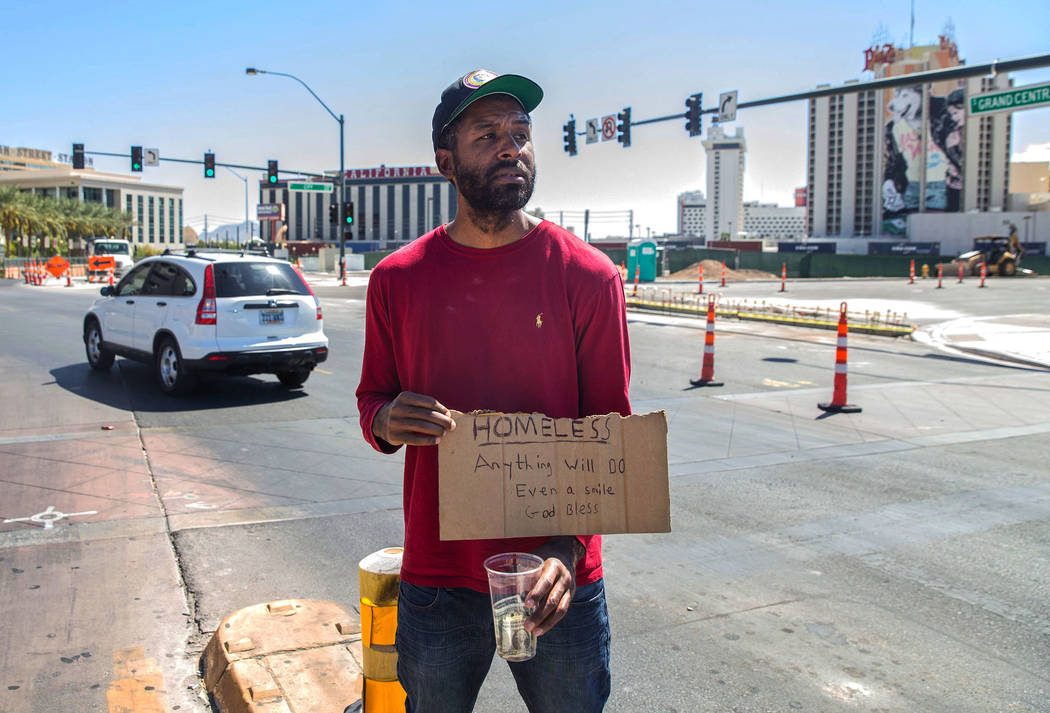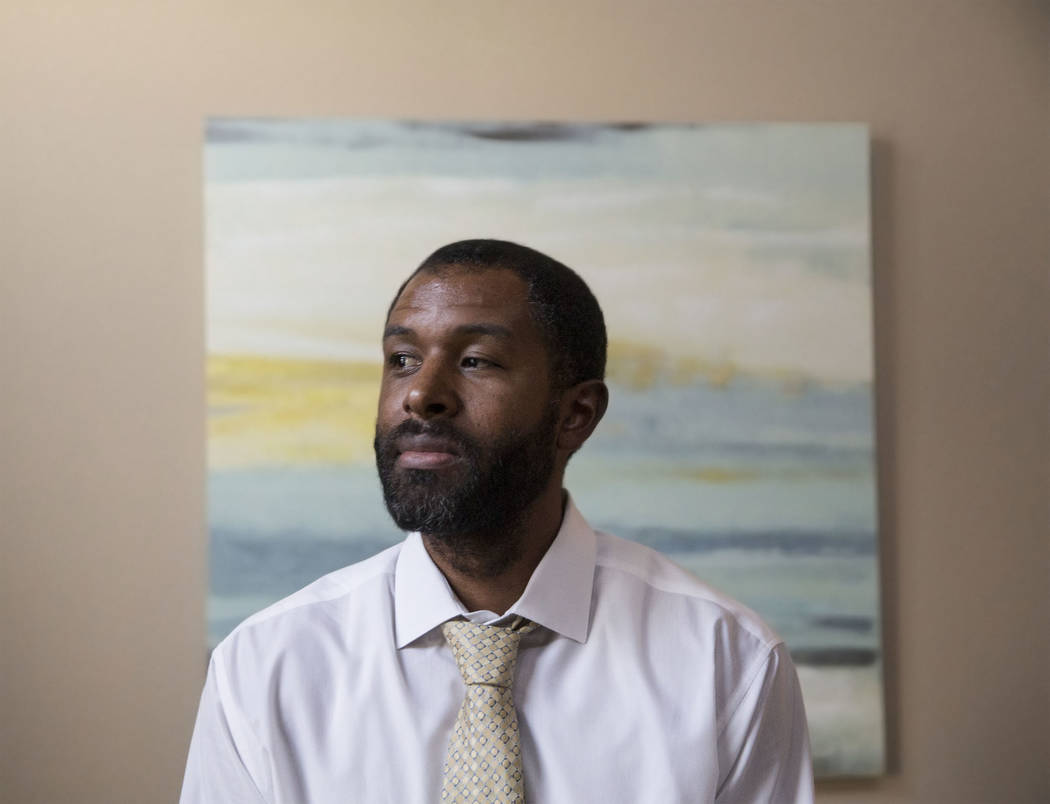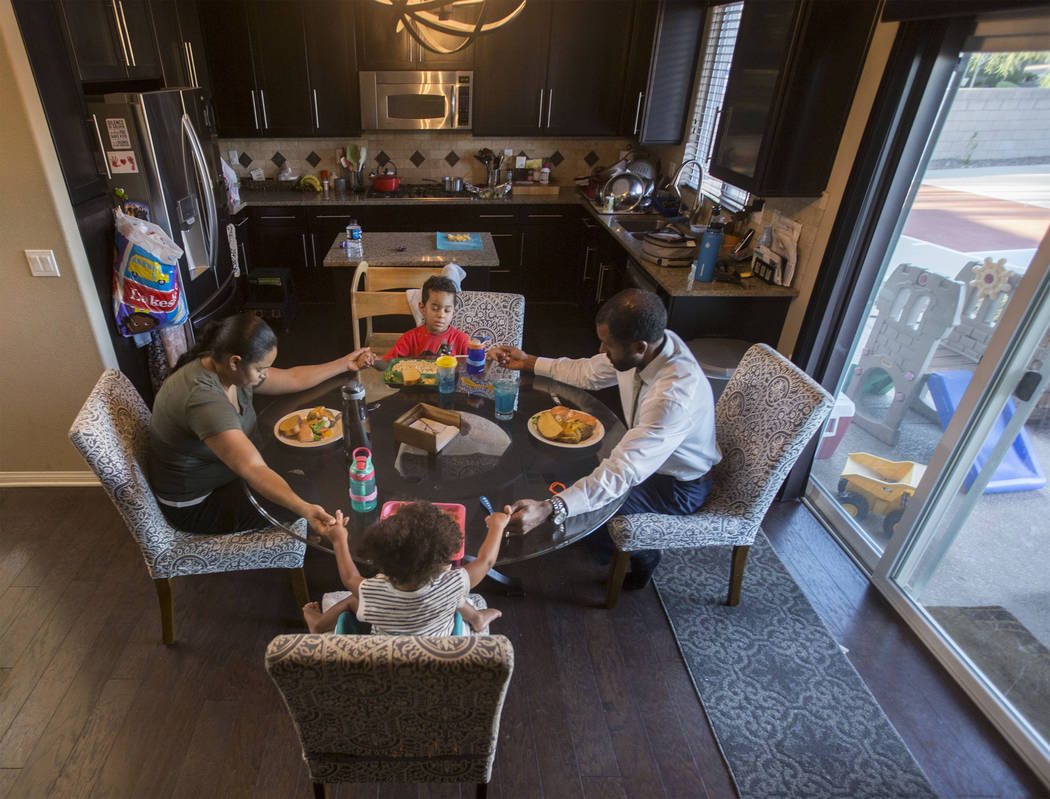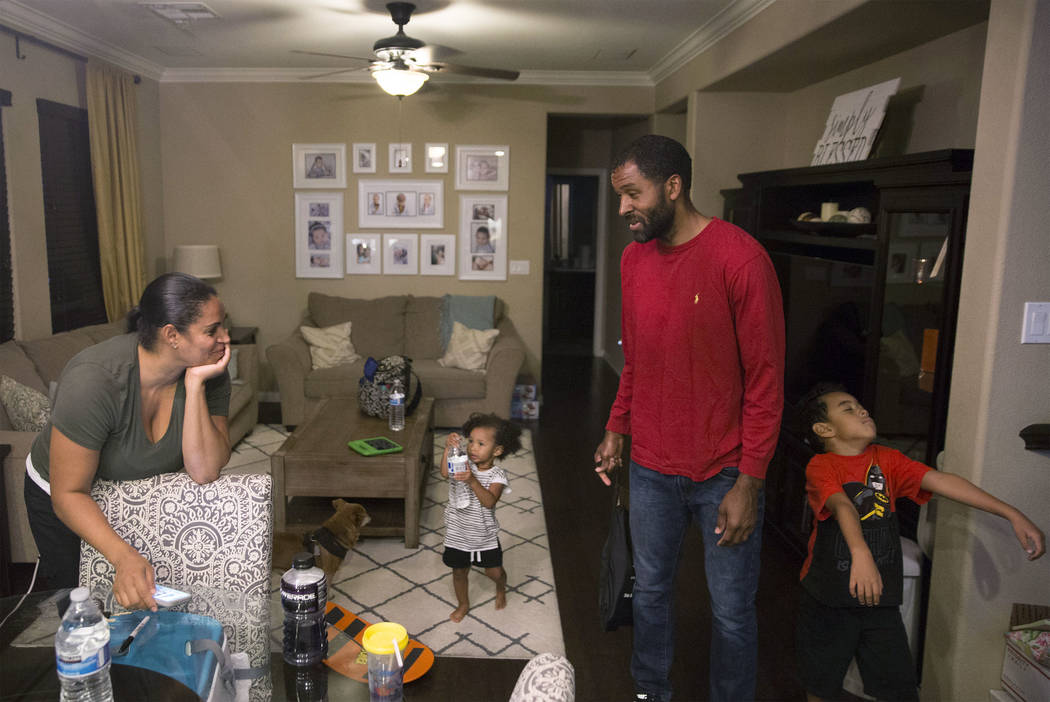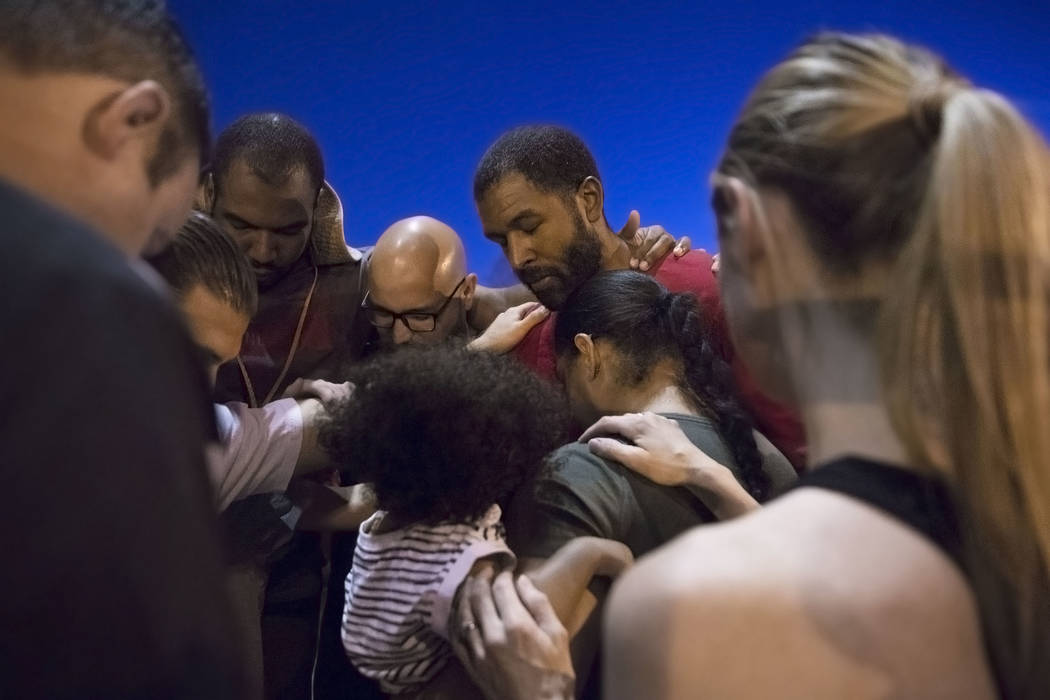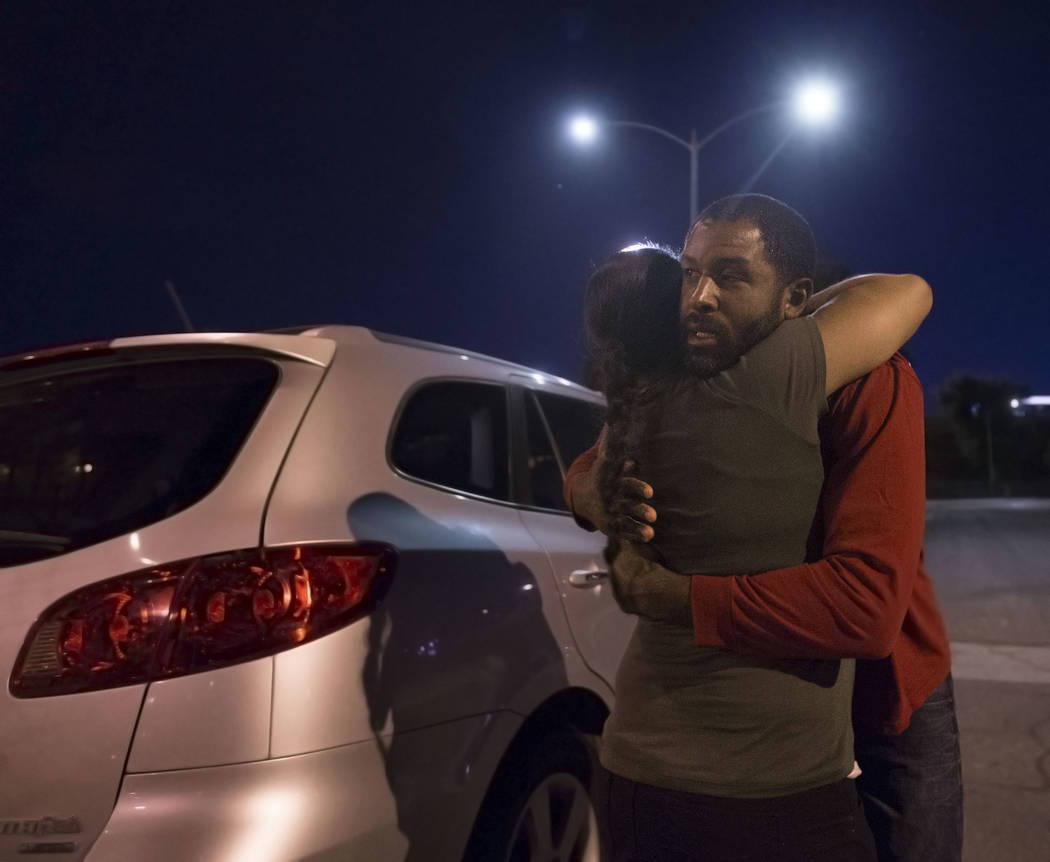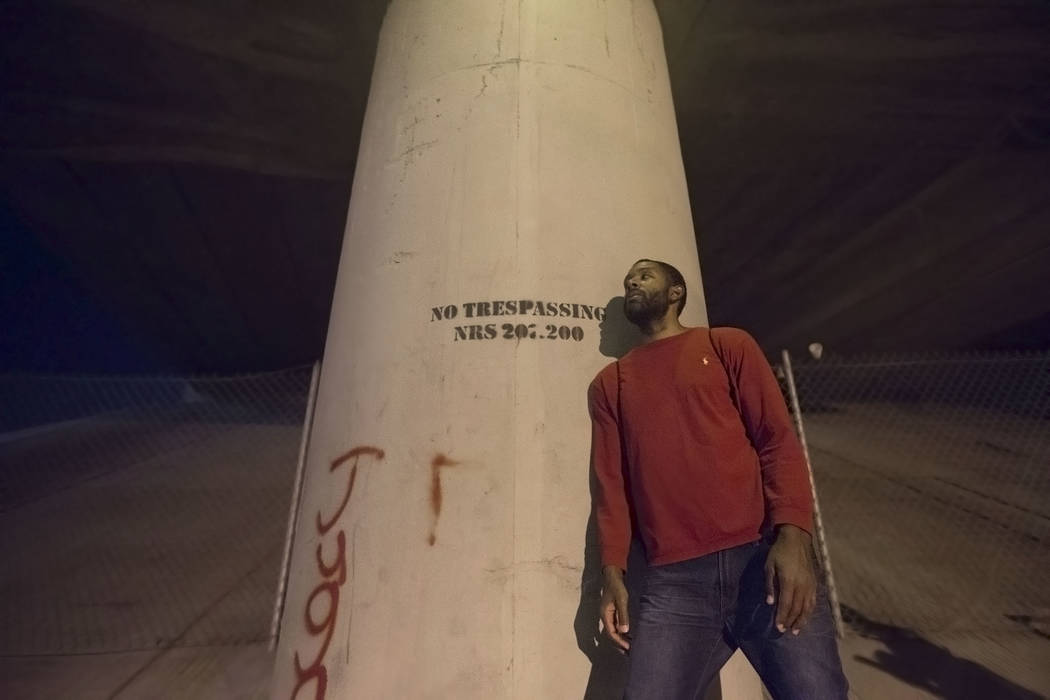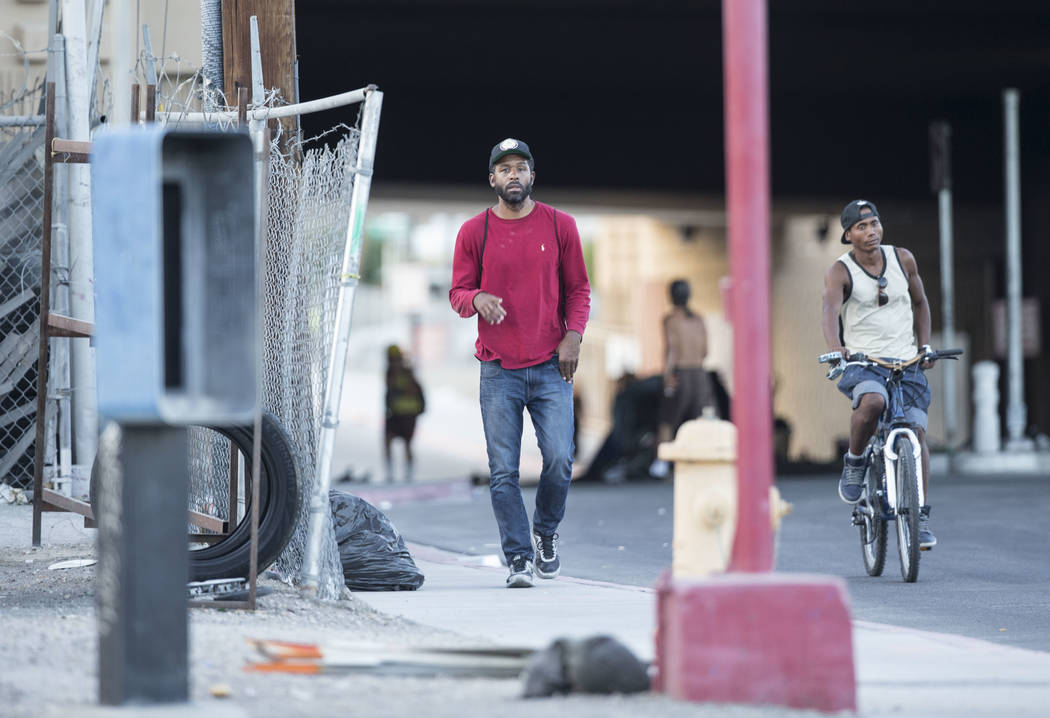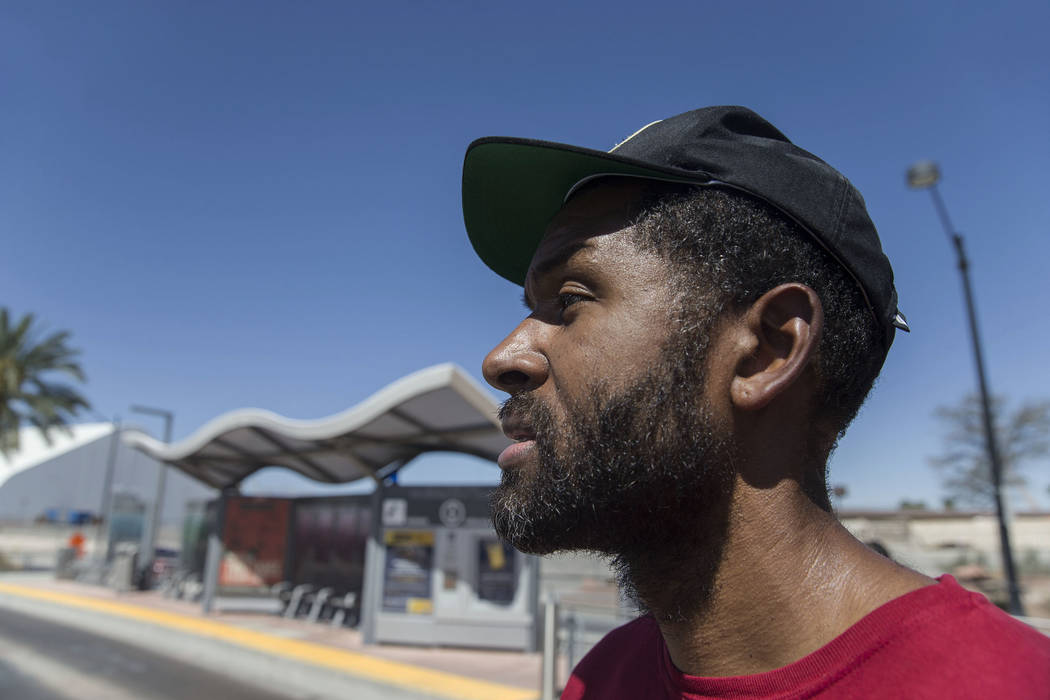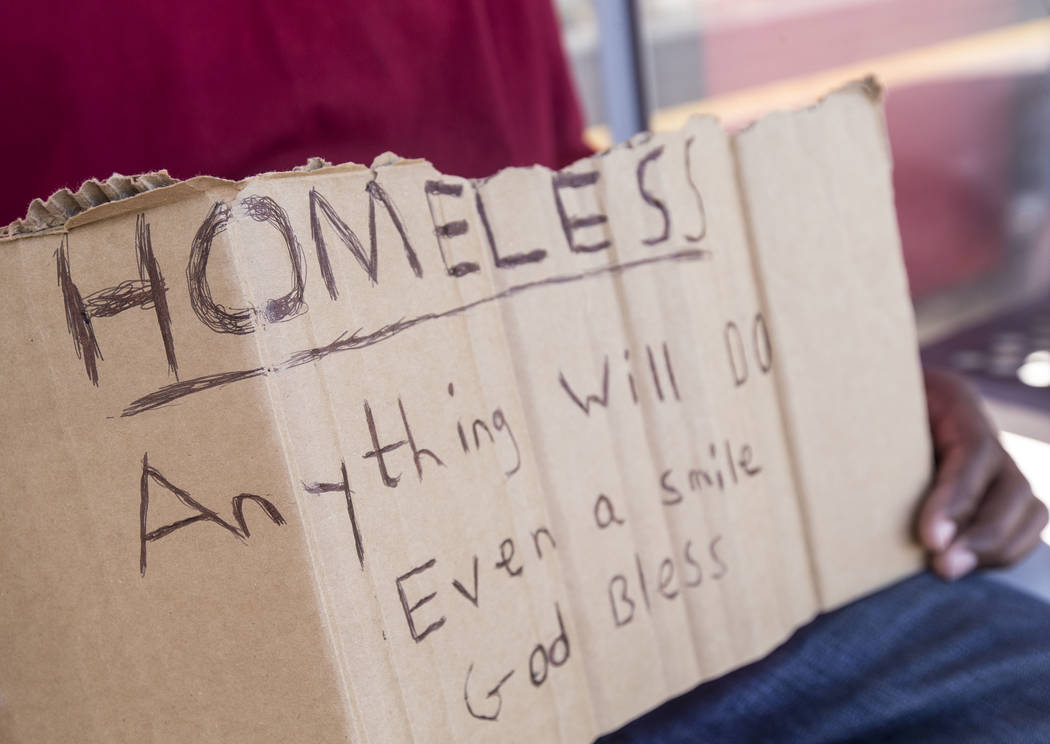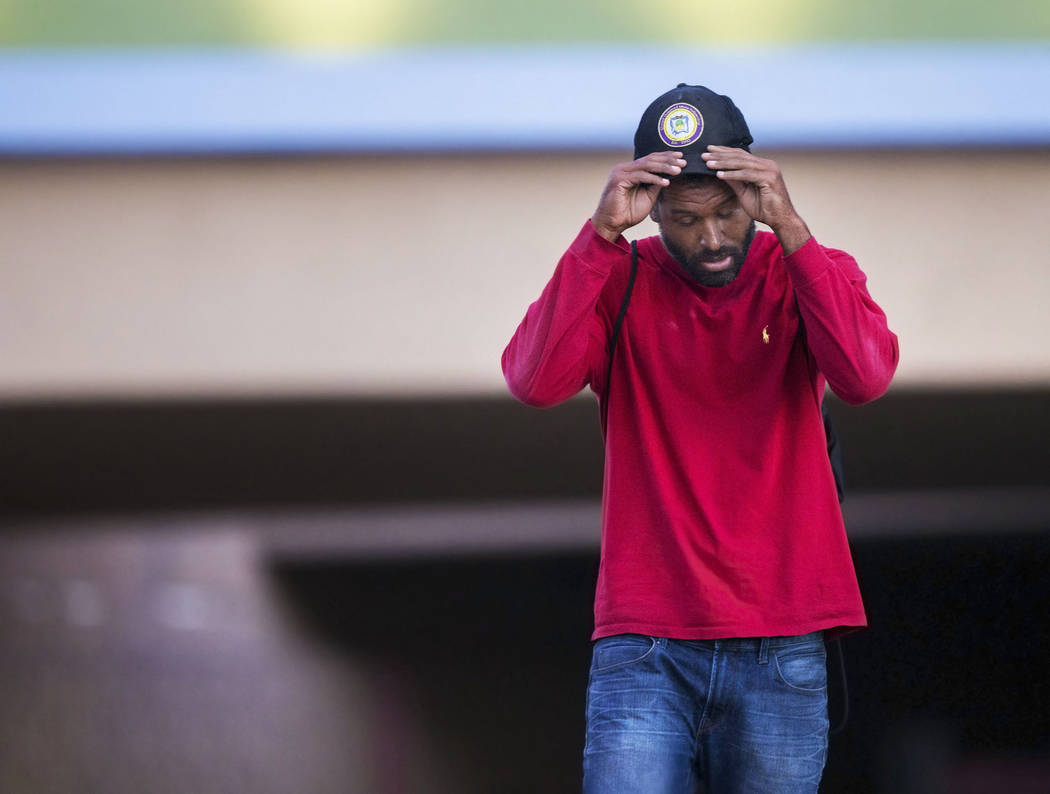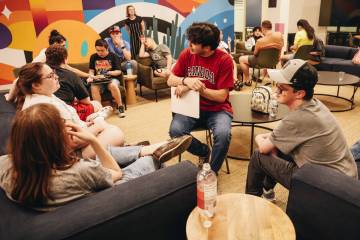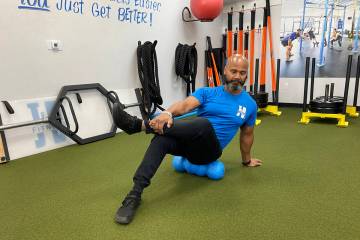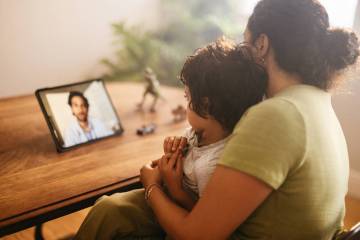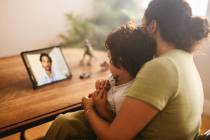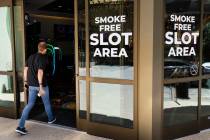Homeless by choice: Counselor spends 48 hours on Las Vegas streets
The day the experiment began, Sheldon Jacobs ate an extra piece of his wife’s salmon, brushed his teeth, used the rest of his deodorant and kissed his family goodbye.
It was Aug. 31, a Friday. It would be 48 hours before he’d be clean again. Jacobs, a 39-year-old mental health therapist at different Covenant of Love group homes, was about to spend two days as a homeless person, living off the streets of downtown Las Vegas.
“Pile it on,” his wife, Nicole, told him as their almost 2-year-old curly-haired daughter, Arianna, danced in her seat to “Baby Shark,” a popular YouTube phenomenon, and stuffed macaroni and cheese into her mouth. Across the table, her 5-year-old brother, Jayden, played with his food.
“I’m full,” Jacobs told her.
“Are you sure?” she asked.
“I’m full of nerves,” he replied.
Later she helped her husband load two 32-ounce water bottles into a small, black backpack and reminded him to keep his driver’s license tucked into his shoe.
She told herself he was just going away on business, but she also was feeling increasingly anxious.
“You need to come back in one piece,” she told him.
A walk in her shoes
Jacobs began thinking about his project weeks earlier, when he encountered a leathery homeless woman at 24 Hour Fitness, walking on the treadmill. With each step, her already shredded shoes ripped a bit more.
Jacobs asked if he could bless her with a new pair.
“I don’t need any new shoes!” she barked.
It was then Jacobs felt called to take a walk in her world.
“I want to understand that emotion toward me,” he said. “For someone to look at me in a certain way.”
The more he thought about the idea, the more important it seemed to follow through.
“Sleeping on the sidewalk, people staring at me, being in this invisible world,” he wrote in his notebook as he prepared for the experience. “I want to know what some of my clients have gone through or felt.”
Nicole was dubious at first, but got on board as she came to realize he was set on it. He spent over a month growing the hair on his close-shaven head, and preparing his thick beard, which had traveled into fuzzy patches down his neck.
“He’s crazy. The possible risks it poses scares me,” Nicole said with a worried smile. “But when I look at the bigger picture, I see why.”
She took him shopping at the Las Vegas Rescue Mission, setting a $10 limit to buy the clothes he would wear on the street.
Together, they picked out a faded pair of Express jeans, a red, long-sleeve Ralph Lauren shirt and a pair of black sneakers. The total: $9.97.
Later, she thought of one more accoutrement to lend an air of authenticity.
“If you’re going to really do it, then experience it,” she said, handing him a piece of cardboard to make a sign.
Spiritual sendoff
Before Jacobs took off, he and his wife met with their Shadow Hills Church family at Ethel Pearson Park.
Eight members — including their pastor — embraced Jacobs, his wife and two kids.
“Lord, God, I thank you for your good and faithful servant Sheldon, as he is not turning a cold shoulder to this really important issue that affects our city,” prayed one church member, Leah Loera.
“He is willing, on your command, to just walk right into the depths.”
Nicole wiped away the tears coursing down her face, buckled the kids in and climbed into their Hyundai to drive back to their North Las Vegas home.
As Jacobs started walking along Washington Avenue toward downtown, he noticed the stark contrast between the glitzy lights and casinos and the man sleeping on a street corner, curled up next to a utility box.
Kindness in the crowd
On his first night, he made his way to the Fremont Street Experience, figuring it was well-lit and relatively safe, and found a wall he could lounge against.
Some in the crowd stared at him, but many others paid him no mind. The children mostly gawked, though, knowing it wasn’t natural for people to be lying on the ground in such a busy area.
At one point, a former student of Jacobs at College of Southern Nevada, where he taught for a few semesters, stood next to him. She didn’t recognize him.
Feelings he couldn’t describe began welling up.
He remembered his boyhood and being raised by a single mom in San Diego, a time when he suffered from a learning disability and never felt accepted. That, in turn, led him to join a gang at 12.
That same suppressed marginalized feeling was creeping back again.
He thought about an uncle he hadn’t seen in 20 years, who suffered from drug addiction and was homeless on and off. The family has struggled to reach him to let him know when his mother died.
At one point a man named Michael approached Jacobs and generously offered him some marijuana and beer. He thanked him but declined.
Michael, who gambles often and is homeless on and off, showed him his bets for the week before taking off.
About 45 minutes later, a man who was part of a group of guys in their 20s approached Jacobs, said he was from the San Francisco Bay Area and asked if he was homeless. When Jacobs answered affirmatively, he slipped him a $20.
“Stay strong,” he said before rejoining his friends.
“That caused me to feel something,” Jacobs said later of the encouraging words. “I felt bad taking that $20, like I wasn’t being completely honest.”
Later, an older couple gave him two untouched prime rib dinners.
Jacobs tracked down Michael and gave them to him.
Taking a toll
As long as Jacobs didn’t fall asleep, he was allowed to hang out on the side of Binion’s, a security guard told him that first night.
But the next night, Saturday, a different security guard firmly told him he could only stand on the Fremont Street Experience and he wasn’t allowed at Binion’s at all.
“Check your cameras!” Jacobs shouted at him. “I sat here all night last night!”
He found himself growing more agitated with authority, particularly the security guards who seemed to watch him constantly and ostracize people they deemed too disorderly.
Discouraged, he found a slab of cement off Ogden Avenue and City Parkway where he could curl up without anyone approaching him. But sleep was another matter. His body stiffened, and he tried sleeping sitting up. Each sound made him more paranoid.
Spiders, cockroaches and crickets crawled on him. He kept imagining a scorpion would invade his makeshift home. It was probably from sleep deprivation, he would say later.
When the sun came up, the temperature began its inexorable climb toward triple digits, prompting him to get back on his feet.
The $20 given by the stranger bought him a breakfast of two sausage biscuits, orange juice and hash browns.
When Jacobs opened his composition book to take some notes, he was surprised to see his wife had slipped a family photo into the inside cover.
It made him smile.
As he prepared to end his 48-hour tour of despair, Jacobs made some final notes.
He had met many people on the streets, some who got sick and fell on hard times, others suffering from mental illness and addiction.
And even though he was about to leave it behind, he felt hopeless.
“For that moment, we had that one thing in common,” he said. “I was able to connect more than in any session.”
He had visited the city’s homeless Courtyard, which gave him water bottles and the contact information for providers that weren’t there on the weekends. Downtown, he purchased Gatorade and went to Binion’s to freshen up in the bathroom.
For lunch, he bought fish tacos at Zaba’s Mexican Grill. He ate slowly, hoping to take his time in the air conditioning.
Paying it forward
In two days, Jacobs had made $46 on the streets — two $20 bills handed to him and a couple odd dollar bills.
He now had about $4 left, and he planned to give it to a group of homeless people living under the Historic Westside overpass.
He’d met them earlier that day at Ethel Pearson Park, a popular hangout for the homeless. There, he saw people washing themselves and their clothes in the water fountain. As it neared 3 p.m., those at the park scattered.
Some went to wait in line for a room at the Las Vegas Rescue Mission, others were forced out because police told them it was a kids’ park.
When he arrived the overpass, the acrid smell of cigarettes and urine permeated the air. The loud thrum of cars driving by and passing overhead echoed off the concrete archways.
He soon found the makeshift family he was looking for, sitting on the right side of the street with a display of potato chips and other convenience store items for sale to other homeless people.
‘They’re my family’
Dawn and Warren Mattson, a married couple in their 50s, had met Betsy Wright, 38, who said her mom left her on the streets. She now calls them mom and dad.
“They’re my family,” she said. “We help each other out, when we’re in need.”
“That’s how it should be,” Jacobs said.
Next to them, a shirtless James Carter rolled cigarettes that they also sell. Sometimes, they can make $30 a day, he said.
The quartet live together in an eight-person tent on the corner of F Street.
“We try to make a dollar bill,” Carter said.
Jacobs revealed that he was a counselor and gave them his remaining $4. This was his last hour of the 48, and he wanted them to have it.
“Somebody was nice enough to bless me,” he said. “At the least, I could pay it forward.”
Contact Briana Erickson atberickson@reviewjournal.com or 702-387-5244. Follow @brianarerick on Twitter.
Homeless resources in Las Vegas Valley
Courtyard Homeless Resource Center — a starting point where homeless individuals can access resources all in one place. Corridor of Hope at 314 Foremaster Lane. Get help by calling 702-229-6117.
Catholic Charities of Southern Nevada — provides various homeless initiatives, such as family services, food services, senior services, immigration and refugee services and housing services.
Caridad — In collaboration with the Courtyard, Caridad provides proactive efforts, in collaboration with the Courtyard, toward ending homelessness by engaging outreach teams to focus on connecting homeless individuals to services on Fremont Street and the downtown area. 702-350-1880.
HELP of Southern Nevada — HELP of Southern Nevada provides four homeless services programs involving case management and permanent supportive housing: Help Them Home, New Beginnings, Cooperative Agreement Benefiting Homeless Individuals and Healthy Living. 702-369-4357.
Lutheran Social Services — Lutheran Social Services provides various homeless services such as food services, rental and/or utility assistance and employment assistance. 702-639-1730
Nevada 211 — 211 is a special telephone numbers to provide information on a variety of topics, including homeless services and housing opportunities. 1-866-535-5654.
Salvation Army — Salvation Army provides various homeless services, including case management, shelter facilities and other transformational resources through their Lied Social Services Campus. 702-870-4430
Shade Tree The Shade Tree provides safe shelter to homeless and abused women and children in crisis and provides additional life-changing services to promote stability, dignity and self-reliance. 702-385-0072



